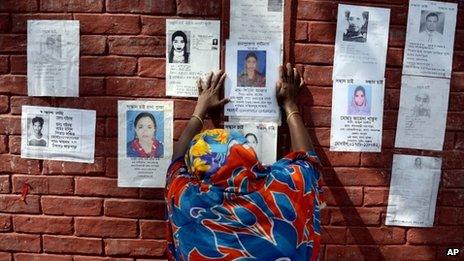Bangladesh building collapse death toll passes 700
- Published

The death toll from the collapse of an eight-storey factory building near the Bangladeshi capital, Dhaka, has passed 700, officials say.
The announcement came after workers pulled dozens more bodies from the rubble. Many people are still missing.
Several people, including the building's owner, have been arrested.
The collapse of the Rana Plaza on 24 April stands as Bangladesh's worst industrial disaster. It sparked outrage among workers in the country.
The previous most deadly structural failure in modern times - excluding the 9/11 terror attacks in New York - was the Sampoong department store in Seoul, South Korea, in 1995, in which 502 people died.
The death toll from Bangladesh now stands at 705. Officials say about 2,500 people were injured in the collapse and that 2,437 people have been rescued.
Rescue officials also say they do not know exactly how many people are still missing as factory owners have not given them precise figures.
Working conditions
It came as hundreds of garment workers who survived the collapse protested by blocking a highway close to the accident site demanding unpaid wages and benefits.
Reports say many of them were working in some of the factories housed in the illegally constructed building.
Local government administrator Yousuf Harun told the Associated Press news agency that they are working with a garment industry body to ensure the workers are paid.
The disaster put the spotlight on conditions in the country's garment sector.
Bangladesh has one of the largest garment industries in the world, and some of the clothes produced in the building were made for Western retailers.
The EU has said it is considering "appropriate action" to encourage an improvement in working conditions in Bangladesh factories.
This includes the use of its trade preference system, which gives Bangladesh duty- and quota-free access to markets in member states.
On Monday the government announced a panel that would inspect garment factories for building flaws.